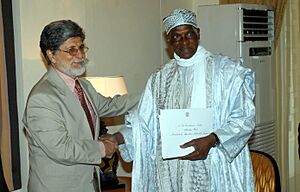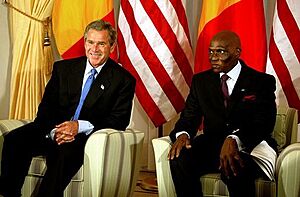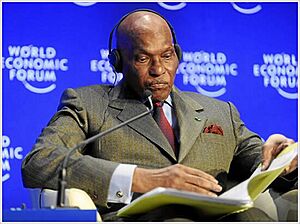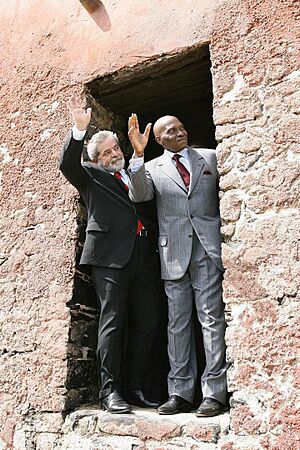Abdoulaye Wade facts for kids
Quick facts for kids
Abdoulaye Wade
|
|
|---|---|
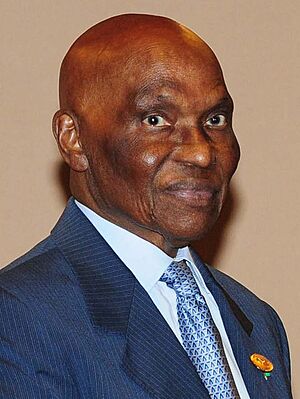
Wade in 2011
|
|
| 3rd President of Senegal | |
| In office 1 April 2000 – 2 April 2012 |
|
| Prime Minister |
|
| Preceded by | Abdou Diouf |
| Succeeded by | Macky Sall |
| Secretary-General of the Senegalese Democratic Party | |
| Assumed office 31 July 1974 |
|
| Preceded by | Party established |
| Personal details | |
| Born | 29 May 1926 Kébémer, French Senegal (now Senegal) |
| Political party | Senegalese Democratic Party |
| Spouse |
Viviane Vert
(m. 1963) |
| Children | 2, including Karim |
Abdoulaye Wade (born 29 May 1926) is a Senegalese politician. He served as the third president of Senegal from 2000 to 2012. He is also the leader, or Secretary-General, of the Senegalese Democratic Party (PDS). He has led this political party since it started in 1974. When he became president, Wade was 74 years old, making him the oldest person to hold that position in Senegal.
Wade was an important leader for the opposition parties for a long time. He tried to become president four times, starting in 1978. He was finally elected in 2000. He won again in 2007 in the first round of voting. However, he lost in the second round of the 2012 election when he tried for a third term.
Contents
Early Life and Education
Wade was born in Kébémer, Senegal, on 29 May 1926. His family was from the Wolof group. He studied and also taught law in France. He earned two special degrees, called doctorates, in law and economics. He was also a dean, which is a leader, of the law and economics department at the University of Dakar in Senegal.
Starting a Political Career
In 1974, Abdoulaye Wade told the president at the time, Léopold Sédar Senghor, that he wanted to start a new political party. President Senghor agreed. The PDS, or Senegalese Democratic Party, was officially started on 31 July 1974.
At first, the party was meant to be for workers. But in 1976, a new law said that only three parties could exist, and each had to have a different main idea. Since other ideas were already taken, the PDS chose to focus on liberalism.
Wade first ran for president in February 1978 against President Senghor. He received about 17% of the votes. In the same year, Wade was elected to the country's parliament, called the National Assembly. He served there until 1980.
When President Senghor announced he would step down in 1980, Wade spoke out. He wanted the army to make sure new elections happened fairly. He ran for president again in 1983 and 1988. Both times, he came in second place behind Senghor's successor, Abdou Diouf. After the 1988 election, there were protests, and Wade was arrested. He later went to France but returned in 1990.
In April 1991, Wade and other PDS members joined a government that included the ruling Socialist Party. Wade became a Minister of State. However, in October 1992, he and the other PDS ministers left the government. They felt that the Socialist Party had too much control.
In the February 1993 presidential election, Wade again came in second. He received 32% of the votes, while Diouf won with 58%. After some unrest in February 1994, Wade was arrested along with many others. He was released in July 1994.
Wade rejoined the government as a Minister of State in March 1995. But he and other PDS ministers left again in March 1998. He was elected to the National Assembly in February 1998 but resigned later that year. He said there were "enough deputies to do the job in my place."
Becoming President (2000–2012)
The 2000 Election
Abdoulaye Wade spent a year in France and returned to Senegal in October 1999. In the first round of the 2000 presidential election, held on 27 February, he came in second place with 31% of the votes. This time, President Diouf did not win enough votes in the first round, so a second round was held on 19 March.
Wade won this second round with almost 58.5% of the votes. He received support from other candidates who had lost in the first round. Wade officially became President on 1 April 2000. He then chose Moustapha Niasse, who had come in third in the first round, to be his Prime Minister.
At first, Wade's party did not have a majority in the parliament. But after the April 2001 parliamentary election, the PDS and its allies won enough seats to have a majority.
A new constitution, or set of rules for the country, was approved in 2001. This new rule changed the presidential term from seven years to five years. However, this change would only apply after Wade finished his first seven-year term in 2007. In September 2002, Wade received the World Peace Culture Award. In December 2004, he signed a peace agreement with rebels in a region called Casamance. This ended 22 years of conflict.
The 2007 Election
On 15 October 2006, Wade was chosen as the presidential candidate for the PDS for the February 2007 election. One of his opponents was Idrissa Seck, who used to be his prime minister and was once seen as his student in politics.
The final results, announced on 11 March 2007, showed Wade winning in the first round with 55.9% of the votes. He was far ahead of his closest opponents. Wade was sworn in for his second term on 3 April. Many African leaders and about 60,000 people attended the ceremony in Dakar.
Some main opposition parties did not accept Wade's victory in 2007. They did not believe he was the rightful president. They refused to take part in the elections for the National Assembly and the Senate later that year. Wade stated in an interview in May 2008 that he would not talk with the opposition unless they accepted him as the legitimate President.
At an African Union meeting in Ghana in July 2007, Wade supported the idea of quickly forming a "United States of Africa." He said that if African countries did not unite, they would be weak and might struggle against stronger, united economies.
In March 2008, Senegal sent troops to the island of Anjouan in the country of Comoros. Anjouan had declared independence. Senegal and other countries helped win the conflict there.
The 2012 Election
In July 2008, the National Assembly approved a change to the constitution. This change made the presidential term seven years long again, as it was before 2001. This new rule would not apply to Wade's term from 2007 to 2012. However, it meant that Wade could potentially run for re-election in 2012 if he was still healthy. On 17 September 2009, Wade confirmed that he planned to run for a third term in 2012.
During a speech on 14 July 2011, Wade used a Wolof phrase that meant "I said it, I can take it back." He used this phrase to explain why he was going back on his 2007 promise not to run for another term. This phrase became a popular saying for those who opposed Wade.
On 27 January 2012, the Constitutional Council officially approved him to run for a third term. After this announcement, angry crowds protested violently in the city. After the first round of voting, Abdoulaye Wade admitted on 27 February 2012 that he had not won enough votes to avoid a second round. He then lost the second round of voting, held on 25 March 2012, to the opposition candidate Macky Sall. Sall had the support of all the candidates who lost in the first round and won by a large number of votes.
Wade was praised around the world for how he handled the 2012 presidential election. He congratulated his opponent on his victory and peacefully stepped down from power. Many organizations, like the African Union and the United Nations, praised Wade's quick acceptance of the results. It was noted that leaders in some of Senegal's neighboring countries had used their armies to stay in power. Because of his actions, Wade is seen as one of the rare African leaders who truly supports democracy. Macky Sall became president after Wade on 2 April 2012.
After the Presidency (2012–Present)
After losing the presidential election, Wade remained the leader of the PDS party. Even though many important people left the party, he stayed in charge. He chose not to run as a candidate in the July 2012 parliamentary election. The PDS won 12 seats in that election, which was a big drop in their number of representatives. However, Wade still said he saw this as a good sign. He said that people expected the PDS to disappear after losing power, but it had become the largest opposition party.
In 2015, even though he was close to his 90th birthday, Wade said he would not retire. He argued that no strong younger leaders had come forward to take his place as head of the PDS.
In the July 2017 parliamentary election, Wade planned to lead a group of opposition parties as a candidate. However, another important opposition leader, Khalifa Sall, and his supporters decided to run separately. This was because they disagreed about who should be the top candidate. The divided opposition did not do well in the election. The group supporting President Sall won 125 seats, which was a majority. Wade's group came in a distant second with 19 seats.
As the top candidate on his group's list, Wade himself won a seat. But he did not plan to serve as a member of parliament. He announced his resignation on 10 September 2017, even before the National Assembly started meeting. He explained that he only ran to support his group in the election.
As of 2025, Wade is still the Secretary-General of the Senegalese Democratic Party (PDS). Even though his power has lessened a bit, he still has a lot of influence within the party.
In the July 2022 parliamentary election, Wade and the PDS joined a large group of opposition parties. However, Abdoulaye Wade decided to leave this group in September 2021. He created a new group called Wallu Senegal. This new group included many of the same parties that had won in the 2017 elections. These local elections were not successful for the PDS. The party struggled and became less important, while the group led by Ousmane Sonko and Khalifa Sall became strong in major cities like Dakar.
Personal Life
Abdoulaye Wade married Viviane Vert in 1963. Their son, Karim Wade, worked for a national agency and later became a Minister of State from 2009 to 2012. Their daughter, Sindjely Wade, worked as a special assistant to the President.
In March 2012, Wade announced he planned to go to Saudi Arabia for a religious trip.
Honours and Awards
National Honours from Senegal
Honours from Other Countries
- France:
 Grand Cross of the Order of Legion of Honour
Grand Cross of the Order of Legion of Honour
- Finland:
- Monaco:
See also
 In Spanish: Abdoulaye Wade para niños
In Spanish: Abdoulaye Wade para niños
 | Aaron Henry |
 | T. R. M. Howard |
 | Jesse Jackson |


